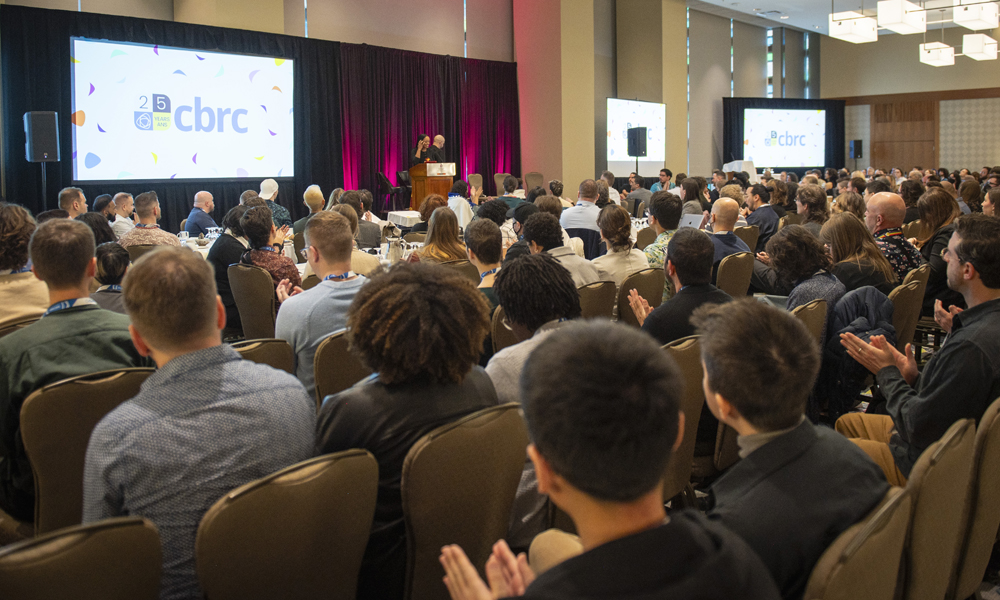Inside the groundbreaking work of the Community-Based Research Centre…
A quiet revolution continues to unfold across Canada. It doesn’t look like the typical kind of activism you might picture – there are no megaphones or protest signs. Instead, there are research teams, peer educators, grassroots organizers and policy advocates, all working under one powerful mandate: to improve the health and well-being of 2SLGBTQI+ people across Canada. This is the Community-Based Research Centre, better known as CBRC, and its impact is reshaping public health from the inside out.
Incorporated in 1999, CBRC is a non-profit charitable organization headquartered in Vancouver (with satellite offices in Toronto and Montreal), which promotes the health of people of diverse sexualities and genders through research and health promotion. The organization’s core pillars – community-led research, knowledge exchange, network building and leadership development – position it as a thought leader, transforming ideas into actions that make a difference in our communities. It is also making a difference with its signature programs: the annual Summit – the largest 2SLGBTQI+ health conference in Canada – and the Sex Now Survey, Canada’s largest and longest-running survey of sexual minority men. First administered on paper at Pride festivals, the survey (now inclusive of all 2SLGBTQI+ people) has evolved into a massive data-gathering tool that informs everything from HIV prevention strategies to mental health programs and sexual health campaigns. It’s research with real-world impact – and it’s driven by lived experience.
A legacy born from the HIV crisis
CBRC began in 1999, during the height of the HIV/AIDS epidemic: a time when queer voices were systematically left out of research, and health policy decisions were made without input from those most affected. The organization, founded by a group of gay men determined to shift that dynamic, started with a radical premise: that community should lead the conversation on its own health.
Today, one of those conversations focuses on the barriers that many queer folks face trying to access PrEP. PrEP stands for pre-exposure prophylaxis, and is a class of medicine that is highly effective at preventing HIV acquisition when taken as prescribed. According to Michael Kwag, executive director at CBRC, while access to PrEP has improved over the years since it was first approved by Health Canada, the biggest direct barriers include cost (e.g., for the medication if they do not have access to private insurance or a public program; for travel costs to doctors and lab appointments), not having access to a knowledgeable or supportive healthcare provider, and stigma related to HIV and/or PrEP, which can impact how people perceive the benefits and risks of taking PrEP in the first place.
“Despite all the efforts that have gone into PrEP education and awareness, we can’t assume that all queer folks know about PrEP, particularly younger folks and newcomers to Canada, who may not have access to information about PrEP,” says Kwag.

Kwag notes that racialized and trans communities in particular – who often face additional barriers to culturally safe and appropriate healthcare and support – are being left behind. That’s something the CBRC intends to put more resources behind. “Our educational campaigns and initiatives have centred the needs and experiences of white cisgender gay men too often, and we need to be working to empower racialized and trans people in our awareness-raising efforts, to ensure that the benefits of PrEP are being realized in these communities as well.”
A new form of HIV prevention
While CBRC started as a research hub, its work today spans a vast and ambitious spectrum: public health interventions, education, peer-led programs, national advocacy and policy development. The organization has become a go-to expert on queer health across Canada, especially for issues that fall through the cracks of mainstream health systems, and what’s on the horizon.
“Long-acting, injectable HIV prevention tools have finally arrived in Canada, adding an exciting and important new tool in our efforts to support the people most impacted by HIV and, perhaps most importantly, for whom oral, pill-based regimens are less accessible or effective” says Kwag. “Not everyone is great at taking pills every day, and the addition of long-acting prevention may help these folks in particular. At the same time, long-acting prevention is not for everyone. Many people will continue taking oral PrEP, and it’s important that we continue to make a range of PrEP options available and accessible to everyone who may benefit from it, based on their own needs and circumstances.”
Making PrEP access truly equitable – beyond just availability
“We have all the knowledge and tools we need to end new HIV infections in Canada, but we need to be investing more in the communities most affected by HIV, and the health systems needed to support the needs of these communities, in order to make PrEP truly equitable and accessible,” says Kwag. “Communities need access to funding and support to ensure that education and outreach efforts are reaching the people who are either unaware of PrEP or need help in order to access it. We also need to ensure that our public health systems have the ability to innovate and develop care models that help meet people where they are at, including people who don’t have access to a regular healthcare provider or who live in a more remote community. The reality is that PrEP is still not fully accessible and available to everyone who needs it, and we need to be powering our communities and systems to take decisive action to close these gaps.”
The future is community-led
CBRC doesn’t just publish reports – they launch movements. In a world where queer and trans rights remain under attack, and where health inequities continue to deepen, CBRC’s work has never been more urgent. Whether it’s developing trauma-informed sexual health resources for queer youth, training doctors on trans-inclusive care, or ensuring that health data reflects non-binary identities, CBRC is constantly pushing institutions to evolve.
Because when communities lead, transformation follows.
Learn more: To support or get involved with CBRC’s work, visit www.cbrc.net, sign up for their newsletter (www.cbrc.net/subscribe) or follow them on Instagram @thecbrc.
To learn more about ViiV Healthcare Canada, visit www.viivhealthcare.ca.
This content is sponsored by ViiV Healthcare Canada.







POST A COMMENT